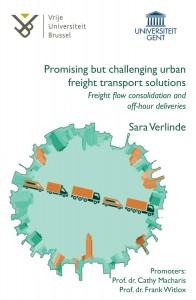
The research presents two possible solutions to reduce the negative impact of urban freight transport: freight flow consolidation and off-hour deliveries. The purpose is to identify feasible, consensual and successful applications of urban freight flow consolidation and off-hour deliveries. To reach that goal a twofold approach is adopted: reassessing the generally accepted logic behind freight flow consolidation and off-hour deliveries as well as their impact and evaluating both concepts and/or their applications from the perspective of all stakeholders.
The abstract of the thesis:
Although inevitable, urban traffic causes air pollution, noise pollution and congestion.Up to 20% of urban traffic is related to freight transport and service trips and, proportionally, it contributes more to the negative side-effects of urban traffic than passenger related traffic. Throughout the past few decades, a range of solutions to reduce the negative impact of urban freight transport have been researched, tested and implemented.
Two possible solutions are: freight flow consolidation and off-hour deliveries.They have two things in common. First, despite the fact that it is generally accepted that there are considerable benefits to both solutions they seem to remain permanently promising and have not been widely adopted yet. Second, they require support of both public and commercial stakeholders to be successful in the long term. The purpose of this thesis is to identify feasible, consensual and successful applications of urban freight flow consolidation and off-hour deliveries. To reach that goal a twofold approach is adopted: (i) reassessing the generally accepted logic behind freight flow consolidation and off-hour deliveries as well as their impact and (ii) evaluating both concepts and/or their applications from the perspective of all stakeholders.
One possible freight flow consolidation solution is to implement an Urban Consolidation Centre (UCC). A review of the available UCC impact assessment made me conclude that 87% of UCCs have a positive impact on the number of urban freight vehicle kilometers. However, this positive impact might have to partially be put down to the lack of high-quality urban freight data and the consequent too positive estimations. Despite the dominant attention for UCCs in the literature on urban freight flow consolidation, there are alternative approaches. This thesis identifies and categorizes them and cites existing,often small-scale examples. One possible alternative approach is to use a Mobile Depot for express deliveries and pick-ups. Evaluating this concept revealed that it decreases the amount of emitted pollutants and the number of diesel vehicle kilometers but doubles the operational costs for the express service provider. The thesis also demonstrates that there is no overall stakeholder support for a general shift of urban freight flows to off-hours in Belgium. There are, however, freight flows that are more suited than others to be shifted to off-hours. My research identifies these freight flows and characterizes them. Based on this research, one particularly suited freight flow would be supermarket deliveries. Evaluating a trial that took place in Brussels revealed that there are considerable time and fuel savings when deliveries to two supermarkets in Brussels are shifted to off-hours and that this solution would be able to receive overall stakeholder support when sufficient measures are taken to keep the noise nuisance for local residents to a minimum. Finally, the thesis contributes to the research field of urban freight transport by introducing the concept of stakeholder involvement in the evaluation of urban freight transport solutions by using Multi Actor Multi Criteria Analysis which is an evaluation tool that explicitly includes the goals and objectives of all stakeholders.
Promotor: prof. dr. Cathy Macharis and prof. dr. Frank Witlox
